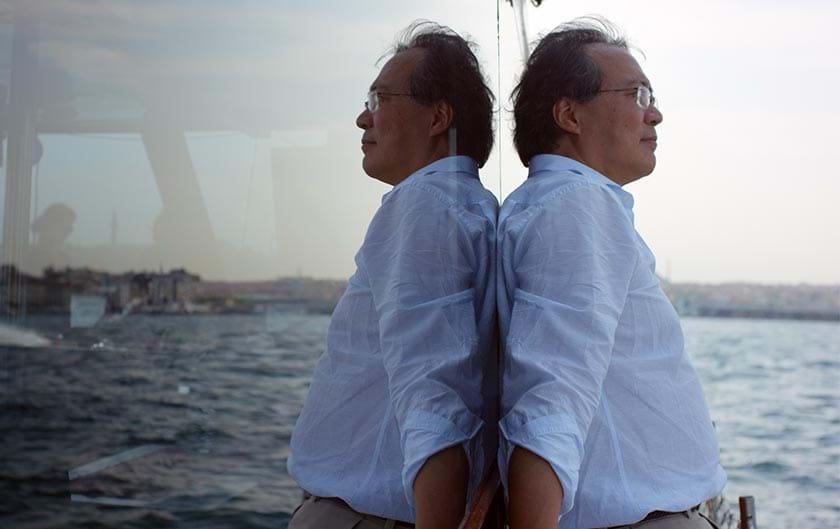
In his latest film, The Music of Strangers, Oscar-winning documentarian Morgan Neville follows acclaimed cellist Yo-Yo Ma as he brings together a band of unlikely musical collaborators with the goal of inspiring and creating cross-cultural connectivity. Fittingly named the Silk Road Ensemble—after the ancient trade route that connected Asia, Africa, and Europe—this multicultural collective of virtuosos travels across the world to perform with and learn from each other, highlighting how music can transcend geographical boundaries, language, and cultures.
Supported by JustFilms and in theaters June 10, the documentary blends performances with interviews and archival footage of the first meetings of the group, described at the time as “the Manhattan Project of music.” By focusing on the personal stories of a few of the ensemble’s mainstays, the film creates an intimate group portrait of passion, talent, and sacrifice. Through these stories, Neville paints a moving, vivid portrait of a bold musical experiment.
I caught up with Morgan Neville and asked him about the film, his passion for telling stories about music and musicians, and why he thinks cross-cultural understanding is so critical in today’s globalized world.
Cara Mertes: You have said that both the Silk Road Project and this film seek to understand how music can change the world. What do you mean and why is it important?
Morgan Neville: People look at politics, war, religion, and other forces that shape societies, but we don’t spend enough time looking at how culture—music, food, art, and language—affects the world. Certainly the political maps of the world do not directly reflect the cultural maps, and the greater that disconnection—for instance with the Kurdish, Persian and Arab regions—the greater the strife.
What music does is create both identity and empathy, not as mutually exclusive things—as politics and religion often do—but as two sides of the same coin. Music allows us to celebrate who we are emotionally, collaboratively, and humanistically.
You were a journalist before you were a filmmaker. What are the differences and similarities between the two professions and their processes?
I have often described documentary filmmaking as “3-D journalism.” The biggest difference is the tools. I have always felt that journalism is a higher calling that is vastly underappreciated. I know many documentarians don’t like being called “journalists.” Some of them don’t even like being called “documentarians.” Some people think that to call yourself a journalist is to say you’re not being an artist. I think that is ridiculous.
For me, the label “journalist” just means your first responsibility is to the truth. My journalism heroes are people like Joan Didion, Gay Talese, Greil Marcus, Timothy Crouse, Peter Guralnick, Tom Wolfe, and Hunter S. Thompson—all writers who explored new ways to tell real stories. We’re all storytellers.
Why have musicians and culture been at the center of so many of your films? How does The Music of Strangers fit into the mold of your other films, many of which have focused on American musical traditions like the Blues and R&B?
I’m a music obsessive. I’ve played in bands since I was a kid, and love listening to and reading about music. That being said, I think the best music documentaries are about more than music. Music is a great Trojan horse into exploring all types of issues—race, gender, economics, celebrity, etc. The Music of Strangers is no different, though the music is furthest afield.
The Music of Strangers is built on the idea that cross-cultural understanding and exploration are positive and even urgent forces in today’s world—one that is at once globalized by commerce and technology, and fragmented by belief systems and instability. Why is that important?
The metaphor of The Silk Road gets at the fallacy of purity. I think we have always been globalized. We have exchanged cultures, goods, food, science, and language for millennia. Things that seem the embodiment of a cultural tradition are in fact already hybrids of other cultures. It’s the belief that this is mine or this is yours that underscores the divisions we see all the time today.
I just watched Yo-Yo Ma perform JS Bach Cello Suite No 6, Sarabande. Along with other emotions, I was struck by his complete integration with the composition. He was being the music, not telling it, much as you describe your approach to filmmaking. Can you explain your interpretation of “being” versus “telling” in your work?
I am a big believer in never telling an audience what to think or feel. They have to get there on their own. Didactic filmmaking is not only bad filmmaking, it’s counter productive. When the viewer finds their own conclusions in a film, they own the ideas so much more. Also, when it comes to a music film like this, so much is already being said in the music and the performances, that to articulate it makes it feel smaller and takes the power out of the message that’s being delivered.
Watch the trailer:
Accessibility Statement
- All videos produced by the Ford Foundation since 2020 include captions and downloadable transcripts. For videos where visuals require additional understanding, we offer audio-described versions.
- We are continuing to make videos produced prior to 2020 accessible.
- Videos from third-party sources (those not produced by the Ford Foundation) may not have captions, accessible transcripts, or audio descriptions.
- To improve accessibility beyond our site, we’ve created a free video accessibility WordPress plug-in.